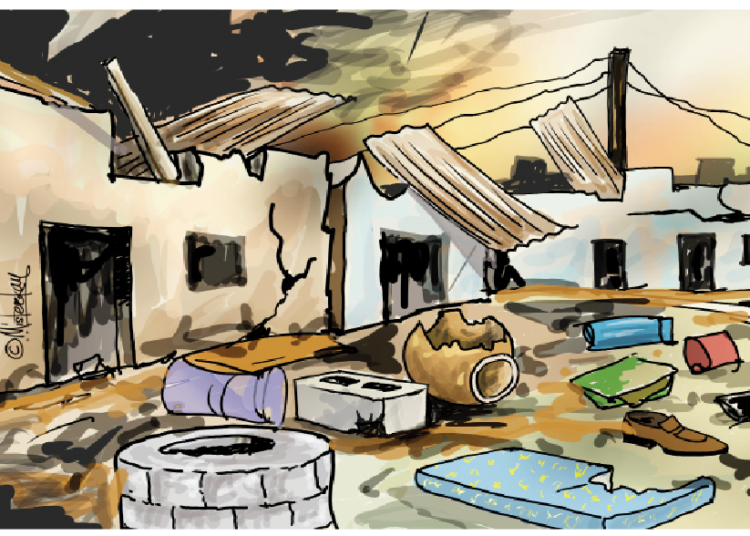In the heart of Nigeria’s Middle Belt, a region once known for its scenic beauty and cultural diversity, a grim and persistent crisis endures. Home to large Christian populations, the region has continued to reel from waves of violence that have left thousands dead or maimed, villages destroyed, and communities displaced.
Despite years of reports, pleas, and government interventions, the killings have intensified as part of a broader pattern of ethno-religious and communal violence that has plagued Nigeria for decades. However, the scale and persistence of attacks on farming communities have given the conflict a uniquely tragic dimension.
In Plateau State, once the home of peace and tourism, the crisis dates back to 2001, when riots in Jos claimed over a thousand lives. What began as sporadic religious tension has since evolved into a relentless campaign of terror, largely targeting rural communities. These attacks, often attributed to militant herders and sometimes jihadist elements, have increased in sophistication and brutality. Entire villages have been razed, churches burned, and families wiped out overnight.
Benue State, the “Food Basket of the Nation,” has seen an uptick in retaliatory violence since the implementation of the 2017 Anti-Open Grazing Law intended to regulate the movement of herders. Farming communities, predominantly Christian and largely Tiv and Idoma, have borne the brunt.
In his Easter message, Bishop Matthew Hassan Kukah of the Catholic Diocese of Sokoto lamented that Nigeria is “gradually becoming a huge national morgue” and urged the President to urgently address the nation’s security challenges. He noted that the ongoing violence is not merely a result of herder-farmer clashes but reflects deeper issues of religious and ethnic intolerance.
Addressing the broader implications of the violence, Bishop Kukah warned against the temptation for communities to resort to self-help or form militias, which could further destabilise the nation. He emphasised the importance of a professional and accountable military force in restoring peace and order.
Targeted, Systematic, and Underreported Violence
In January, over 30 people were killed in a coordinated night raid in Mangu LGA of Plateau State. Eyewitnesses described gunmen moving from house to house, raping women, executing families and torching homes.
In March, another massacre in Kwande LGA of Benue State left 25 villagers dead, including many women and children. Survivors fled into the forests barefoot, returning days later to the charred remains of their homes.
Over the Easter period, when Christians celebrate hope and renewal, communities were once again plunged into mourning with a series of brutal attacks. In Plateau State’s Bokkos and Mangu LGAs and Benue’s Guma and Gwer villages, gunmen launched coordinated assaults on predominantly Christian villages, killing dozens and leaving scores injured. Entire families were wiped out in the dead of night, homes were set ablaze, and places of worship desecrated.
Human rights organisations and local monitors report that at least 500 people have been killed across both states since the beginning of the year. Over 300,000 remain internally displaced, many of them living in substandard camps without access to basic healthcare, education, or protection.
Community leaders, religious bodies, and international observers have consistently characterised the killings as targeted attacks on Christian communities. “This is not just a land conflict. This is ethnic and religious cleansing by stealth,” said Rev. Gideon Para-Mallam, a prominent peace advocate based in Jos.
He’s not alone. The Christian Association of Nigeria (CAN) and several Christian leaders across the region have condemned what they describe as the government’s failure to protect its citizens and its silence in the face of targeted violence. “Our people are being wiped out, and the world is silent,” one Benue-based priest said during a memorial mass in February. “How many more must die before this is seen for what it is?”
Several attacks go unreported in national media, often reduced to statistics or generic headlines like “Clashes Between Farmers and Herders,” which many local communities feel whitewashes the religious and ethnic dimensions of the crisis.
Since January, human rights monitors report that over 500 people have been killed across Plateau and Benue. More than 300,000 remain displaced, many living in squalid camps without healthcare, education, or protection.
A Security Apparatus in Question
The Nigerian government has repeatedly pledged to address the insecurity, yet meaningful change remains elusive. Military operations in the region have yielded few results, and there are widespread accusations of collusion and negligence on the part of security forces.
In Plateau State, locals allege that despite repeated calls for help, security operatives often arrive hours after an attack—if they come at all. “We saw the soldiers at the checkpoint. We told them what was happening. They said they had no orders,” recounted a survivor of the January Mangu massacre.
Benue State’s governor, Hyacinth Alia, has condemned the attacks and appealed to the federal government for support, but even his calls have grown increasingly desperate. “We are under siege. We are mourning every week. Our people are tired, and their faith in government is waning,” he said during a press conference in Makurdi last month.
Beyond the staggering death toll, the psychological and social costs are immense. Children are growing up in displacement camps, traumatised by violence. Communities are fracturing under the strain of continuous attacks and displacement. Churches that once served as sanctuaries have become makeshift morgues.
Entire generations are being traumatised and denied the chance at a normal life. Farming communities, once the backbone of local economies, are abandoning their land out of fear. Hunger and malnutrition are rising, with the UN warning that the ongoing violence could worsen food insecurity across Nigeria.
The Path Forward – Accountability and Justice
In a recent report, Amnesty International condemned the Nigerian government for failing to investigate and prosecute those responsible for the attacks. The U.S. Commission on International Religious Freedom has also renewed calls to designate Nigeria as a “Country of Particular Concern” due to religiously motivated violence.
But human rights experts say what’s needed most is political will at home. “There can be no peace without justice. Nigeria must move beyond rhetoric and begin to hold perpetrators accountable,” said Dr. Fatima Akilu, a psychologist and conflict expert. “Until communities see justice, the cycle of violence will continue.”
Ending the crisis in Plateau and Benue requires more than military force—it demands a multi-pronged approach that addresses the root causes of the violence: land disputes, religious intolerance, weak governance, and impunity. Reconciliation initiatives, while important, must be accompanied by firm action against perpetrators and meaningful support for victims.
The federal government must also reform its security architecture to ensure that response times are swift and impartial. Early warning systems, better surveillance, and community policing could save lives. Moreover, media and civil society must play a role in amplifying the voices of victims and shifting the narrative. “We cannot normalise this violence,” said journalist Solomon Elisha, who has covered the Middle Belt crisis for over a decade. “Silence and euphemisms help the killers.”
How many more must die in the Middle Belt before Nigeria—and the world—truly responds? This crisis is not just a northern Nigerian problem; it is a national tragedy and a moral stain. For every village burned, every place of worship desecrated, and every child orphaned, the country inches further from the ideals of unity and peace.
We’ve got the edge. Get real-time reports, breaking scoops, and exclusive angles delivered straight to your phone. Don’t settle for stale news. Join LEADERSHIP NEWS on WhatsApp for 24/7 updates →
Join Our WhatsApp Channel










